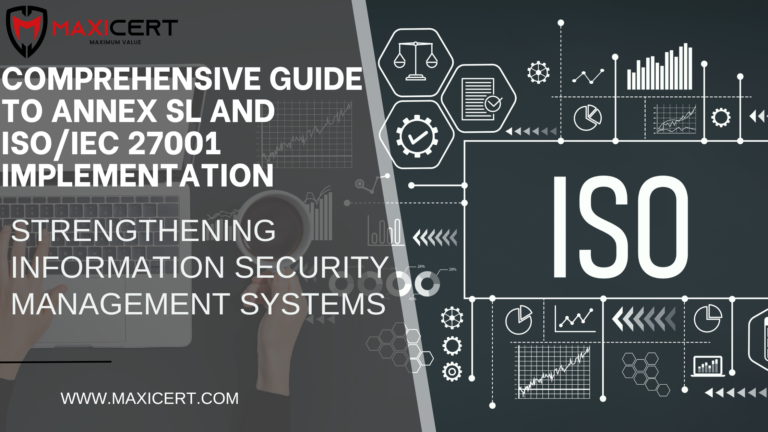Comprehensive Guide to Annex SL and ISO/IEC 27001 Implementation: Strengthening Information Security Management Systems

Introduction
Annex SL is the high-level framework for all ISO management system standards, providing a common structure that simplifies integration across different ISO standards. ISO/IEC 27001, the standard for Information Security Management Systems (ISMS), adopts Annex SL to ensure comprehensive operational control, performance evaluation, internal auditing, and management reviews. This guide outlines key requirements of Annex SL and how they are implemented in ISO/IEC 27001:2022.
Annex SL - 8. Operation
8.1 Operational Planning and Control
The organization shall:
- Plan, implement, and control processes to meet requirements and implement actions determined in 6.1.
- Establish criteria for processes and implement controls accordingly.
- Maintain documented information to ensure processes are carried out as planned.
Additionally:
- Control planned changes and mitigates adverse effects of unintended changes.
- Ensure outsourced processes are controlled.
Request A Free Quote
ISO/IEC 27001:2022 - 8.2 Information Security Risk Assessments
Organizations must conduct regular risk assessments and document results.
ISO/IEC 27001:2022 - 8.3 Information Security Risk Treatment
Organizations should implement risk treatment plans and document the results.
Audit Tool
Whom to Meet: Management Representative, Process Owners
Documented Information to Review: Risk assessment procedure, Risk Treatment Plan, SOA
Audit Questions:
- What are the risk assessment criteria?
- What is the management’s risk appetite?
- Were actions taken on time per the Risk Treatment Plan?
Annex SL - 9. Performance Evaluation
The organization shall:
- Determine what needs to be monitored and measured.
- Use valid methods for monitoring, measuring, and evaluating results.
- Retain documented information as evidence of performance.
- Evaluate the performance and effectiveness of the management system.
Plain English Explanation:
ISMS performance can be monitored using various devices (e.g., firewalls, intrusion detection systems). Logs can be collected and analyzed to evaluate the effectiveness of security controls.
Audit Tool
Whom to Meet: Network team, application team, IT infra team, Process Owners
Documented Information to Review: SOPs, IT policies, log management policy
Audit Questions:
- What devices are monitored?
- Where are logs stored for the last six months?
- What are the server hardening parameters?
- How are controls evaluated to meet objectives?
Annex SL - 9.2 Internal Audit
ISO/IEC 27001:2022 – 9.2 Internal Audit
The organization must conduct internal audits at planned intervals to ensure ISMS:
- Conforms to both organizational and international requirements.
- Is effectively implemented and maintained.
Organizations should plan, establish, and maintain an audit program that defines criteria and scope, selects impartial auditors, and ensures audit results are reported.
Plain English Explanation:
- Conduct audits by independent personnel.
- Maintain audit records and follow up on issues identified during audits.
Audit Tool
Whom to Meet: Management Representative, ISMS Implementation Team
Documented Information to Review: Internal audit plan, audit procedure, CAPA policy
Audit Questions:
- When was the last internal audit conducted?
- What were the audit findings?
- How is the internal audit team’s capability evaluated?
Annex SL - 9.3 Management Review
ISO/IEC 27001:2022 – 9.3 Management Review
Top management must review the ISMS at planned intervals to assess suitability, adequacy, and effectiveness. This review should cover:
- Status of previous management review actions.
- Changes in internal/external issues.
- ISMS performance, audit results, and corrective actions.
- Risk assessment results and improvement opportunities.
Plain English Explanation:
- Review ISMS performance, customer feedback, and security incidents.
- Identify actions for improvement and resource allocation.
Audit Tool
Whom to Meet: Management Representative
Documented Information to Review: MRM minutes, action plans for MRM issues
ISO/IEC 27001 internal audit checklist
Conclusion
Annex SL provides a structured framework for implementing and maintaining an effective ISM under ISO/IEC 27001:2022. By ensuring proper operational control, risk management, internal auditing, and management reviews, organizations can strengthen their information security posture, improve compliance, and enhance operational efficiency.
Take the Next Step Toward Strengthening Your Business Today
Need help implementing or improving your ISO/IEC 27001 ISMS? Our experienced consultants can guide you through the process, ensuring compliance with Annex SL and other ISO standards. Contact us today for a tailored consultation.
Get in touch
+91 9945121978
Need A Free Estimate?
Get a free consultation and Checklist to get certified for ISO , HALAL, CE Mark Certification.
FAQ
What is Annex SL in ISO standards?
Annex SL is a high-level structure that provides a common framework for all ISO management system standards, ensuring consistency and easier integration across standards.
How does ISO/IEC 27001:2022 implement Annex SL?
ISO/IEC 27001 adopts Annex SL to define operational control, risk assessment, performance evaluation, internal audits, and management reviews to ensure robust ISMS.
Why are internal audits essential in ISO/IEC 27001?
Internal audits help identify nonconformities, ensure compliance with ISO requirements, and drive continuous improvement of the ISMS.



